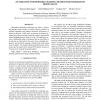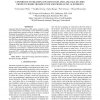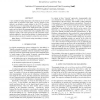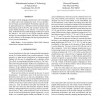159
Voted
ICASSP
2008
IEEE
15 years 8 months ago
2008
IEEE
Compressive sensing aims to recover a sparse or compressible signal from a small set of projections onto random vectors; conventional solutions involve linear programming or greed...
112
Voted
ICASSP
2008
IEEE
15 years 8 months ago
2008
IEEE
Discriminative training for language recognition has been a key tool for improving system performance. In addition, recognition directly from shifted-delta cepstral features has p...
106
Voted
ICASSP
2008
IEEE
15 years 8 months ago
2008
IEEE
In the case of multicomponent AM-FM signals, the idealized representation which consists of weighted trajectories on the time-frequency (TF) plane, is intrinsically sparse. Recent...
115
click to vote
ICASSP
2008
IEEE
15 years 8 months ago
2008
IEEE
This paper proposes a clustering approach to parameter estimation in distributed sensor networks. The proposed approach is an alternative to the conventional centralized and decen...
93
Voted
ICASSP
2008
IEEE
15 years 8 months ago
2008
IEEE
Information distillation techniques are used to analyze and interpret large volumes of speech and text archives in multiple languages and produce structured information of interes...
99
Voted
ICASSP
2008
IEEE
15 years 8 months ago
2008
IEEE
In this work we implement a confidence estimation system based on a Naive Bayes classifier, by using the maximum entropy paradigm. The model takes information from various sourc...
109
Voted
ICASSP
2008
IEEE
15 years 8 months ago
2008
IEEE
Automatic Speech Recognition (ASR) systems continue to make errors during search when handling various phenomena including noise, pronunciation variation, and out of vocabulary (O...
103
Voted
ICASSP
2008
IEEE
15 years 8 months ago
2008
IEEE
A new method for hiding digital data in the bitstream of an ACELP speech codec is proposed in this paper. The key element of our method is an alternative search strategy for the A...
83
Voted
ICASSP
2008
IEEE
15 years 8 months ago
2008
IEEE
This paper extends language identification (LID) techniques to a large scale accent classification task: 23-way classification of foreign-accented English. We find that a pure...
113
click to vote
ICASSP
2008
IEEE
15 years 8 months ago
2008
IEEE
In this paper we describe the application of a feature-space transform based on constrained maximum likelihood linear regression for unsupervised compensation of channel and speak...





